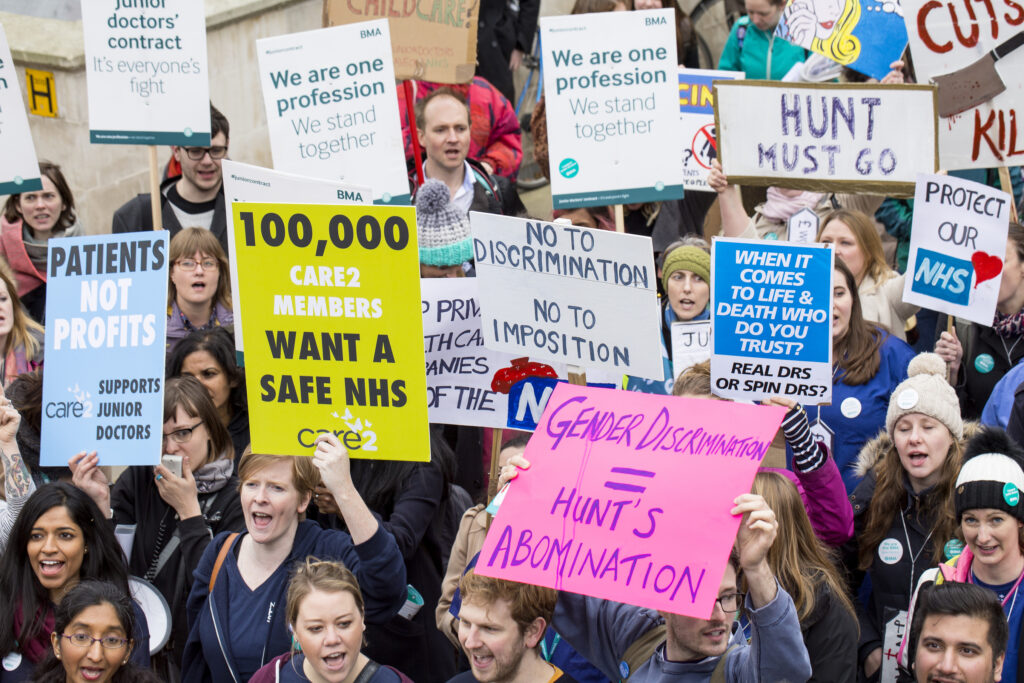Junior doctors are getting a raw deal and they have been pushed to the current strike action. Please don’t look for a sneaky ulterior meaning in my views – there really isn’t one.
Contrary to popular belief, we clinical negligence solicitors don’t want to be swamped with horrific cases where tired doctors have made obvious mistakes. We don’t want to be bombarded with calls about overrun practices not being able to deal with patients on time, or ever. We don’t want to be flooded with enquiries that revolve around very few doctors being here because the majority have fled overseas to be paid fairly. We want patients to be treated properly and correctly and sure, we’ll be here for the exceptional instances where this doesn’t happen. Don’t forget that even us lawyers have friends (honestly!), family and colleagues who are patients of the NHS.
Unfortunately Jeremy Hunt seems dead set on changing the terms of the contracts for junior doctors without their consent. There are concerns that the financial penalties currently in place for working too many hours will be removed. The Government is attempting to placate us by saying that there would be an absolute limit of 72 hours in any week. Great, but let’s think about this. Who really wants to be the last patient operated on day 5 of a working week after 5 straight 13 hours shifts? Not me buddy. That’s a sure fire way for a referral form to be missed or a swab to be left inside a patient or a symptom to be overlooked and a wrong diagnosis made. It’s likely to be even worse if the financial penalties forcing doctors to work over and above the safe maximum hours are removed.
Also, in reality, as there will be the same proportion of junior doctors working for the NHS, the options to those doctors will roughly be:
- Option 1: change a weekday shift over to a weekend shift; easy? No. The weekday shifts are already massively understaffed so it’s more likely to be
- Option 2: work weekends in addition to weekdays but get paid the same.
Fair? I don’t think so.
The Government will have you believe that there isn’t enough money to pay the doctors fairly. Let’s take a look at some wasted costs within the NHS and particularly the NHS Litigation Authority (NHSLA), who are the ones that deal with defending clinical negligence claims. In July 2015 my blog summarised some of the common reasons why costs can be racked up in clinical negligence cases because of the NHSLA’s conduct. So, instead of focusing on shafting the junior doctors to a point where they just refuse to work anymore, why don’t all parties rally together and think of appropriate ways to reduce costs in the NHS. There is currently a lot of press about this in terms of fixed fees for clinical negligence cases. We are all for it as long as the rules aren’t created solely by the NHSLA and as long as the result of the fixed costs doesn’t restrict the patient from bringing a thorough claim and having access to justice.
Yes, there are ways and means to do this. In fact, this has already started happening without fixed costs being implemented. The NHSLA’s net operating costs went down by 27% over the year 2014-2015 which is a big saving and it’s a great start. This was hidden somewhere in the NHS annual report last year.
Overall, the statistics speak for themselves. This is the first time in 40 years that junior doctors have resorted to strike action. The 48 hour strike which was due to start on the 26th January was called off today so striking clearly isn’t an easy decision for the doctors or the British Medical Association. However, there is still a full walk out planned for the 10th February. Ultimately, if we want our doctors working hard but working safely, then we need to listen to their needs and make sure they aren’t over-stretched and underpaid.

